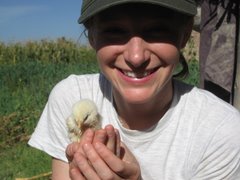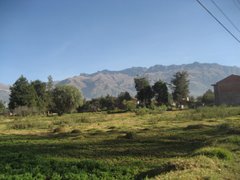Here is a reflection written my Mama on their trip to visit me in May... enjoy!!!!!!!
PS- Since I was so slow at updating the blog in the last 2 months, I recommend you scroll down to the last part you read and read up- i promise it will make more sense that way.
PPS- There are photos and more to come from my parents soon.Peter and I spent 2 amazing weeks in Bolivia at the end of April. Anna lives in the Chiquitania region, a remote tropical region with cattle farms accessed mainly by rutted dirt roads. This region is home to beautiful churches built during the brief Jesuit period before the priests were expelled in 1767. We timed our trip for the biennial Chiquitania Baroque Music Festival. So, we traveled to many of the mission churches and heard sacred and divine music played by amateurs and professionals from the region and from around the world. We were thrilled by the local school orchestra as we were by Israeli, Swiss and British musicians. Some of the music performed was composed in the Chiquitania during the 18th century.
While the Music Festival was the backdrop, the main purpose of the trip was to be with Anna and to learn more about her life as a Peace Corp volunteer in this distant and impoverished part of the world. We arrived at a moment when Anna was frustrated with the lack of progress on her plastic recycling project and considering moving to another site. Nonetheless to us, our daughter looked happy and strong. We particularly enjoyed meeting her many, many friends and acquaintances. During the first 2 days in Santa Cruz, a city a 7-hour train ride from Anna’s home, we were amazed by how many people Anna knew. We were delighted by an invitation to have tea with the extended family of Anna’s landlady. And, we had dinner with Tom and Anna Sullivan, Peace Corps friends who live and work in a town called Okinawa. Yes, it was settled by Japanese after World War II. Anna was a great tour guide and she speaks Spanish! You should have seen her negotiate the price with the driver who took us through the back roads of Chiquitania for our Baroque Music Festival Tour. She looks sweet but she drives a mean bargain.
The countryside in the southeastern lowlands is very pretty. We were there at the end of the rainy season and it was lush. Bolivia has more butterflies than anyplace that I have ever been in my life. During our first weekend in the city, we went to a butterfly conservatory and saw some beautiful specimens. But you don’t need to go to a conservatory to see butterflies. They are everywhere!
In San Jose de Chiquitos, we stayed in Anna’s rooms. She gave up her bed for us and so we slept under a DEET-impregnated bed-tent for the first time in our lives. The area is not high-risk for malaria, but Peace Corps supplies the bed tents and they do keep other critters out of the bed. Anna’s house is very pretty. She painted her rooms in blues and greens and decorated with lots of pictures of friends from home. The central courtyard is full of flowers and at the time of our visit there were 2 parrots in cages and a dog with a new litter of puppies. While it is very comfortable, it’s still not quite like back home. Anna filters all of her water; her shower was not working (blocked with leaves and dirt); one of her electrical outlets caught on fire while we were cooking breakfast one morning; and there is no heating or air conditioning. Actually, what I have appreciated most about the US since coming home is tap water. Tap water in the US is delicious, healthy, free and available almost anywhere. Let’s bring back those water fountains!
We were so busy in San Jose de Chiquitos. In addition to the baroque concerts, there was the annual San Jose festival complete with traditional dancing and parades. We enjoyed meeting some of the people Anna works with and went to the dedication of the new hospital. We had a delightful time helping Anna teach basic hygiene to kindergartners at a local school. A highlight of the trip was touring the church in San Jose de Chiquitos with a Bolivian art historian supervising the reconstruction of the church as a UNESCO site. Anna knows him from the Environmental Committee that she serves on.
So many experiences in Bolivia were unexpected. Try to imagine being awakened at 4 in the morning by the sound of a military band playing below the hotel window. This took place in Santiago, a remote and pretty village 2 hours from Anna’s town. A musical group from Columbia had made the long journey to play ancient music in the church. They were warmly welcomed on a cold night by soldiers lining the streets and the town square holding torches to light their way and a military brass and percussion band that played on and on. Above their doorway, the hotel hung a huge welcome sign made from cardboard boxes and tissue paper with candles for illumination.
On the last day of our trip, there was a referendum on “autonomia” in the Santa Cruz department. There was great excitement about the possibility of becoming more autonomous from the national government with more ability to keep resources in the region. On the day of the vote, we stayed at our hotel because nothing was open except the polls. All stores, restaurants, and businesses were closed. The buses and taxis were not running. The region voted overwhelmingly in favor of “autonomia”. That evening at 6 pm everything opened and people were out and about in a celebratory mood. We attended one last Baroque music festival before heading for home.
We only saw a small corner of Bolivia, but were impressed by the beauty of the country and the warmth of the people. We saw how hard life is for the majority, and are less likely to take our comforts for granted. For me, Bolivia is the land of surprises and I can’t wait to return.











